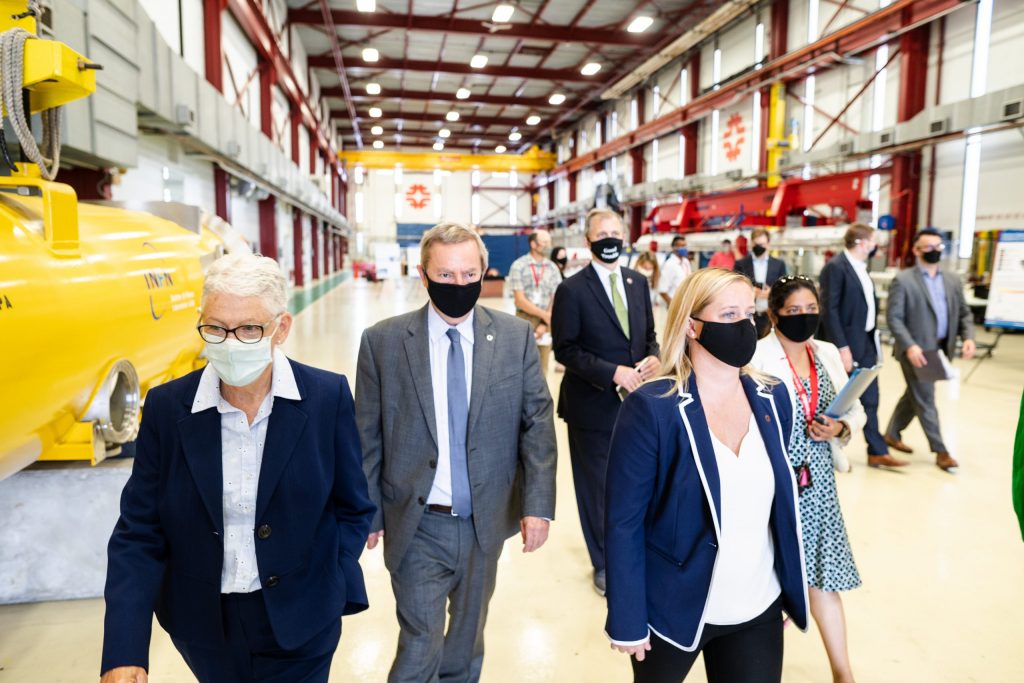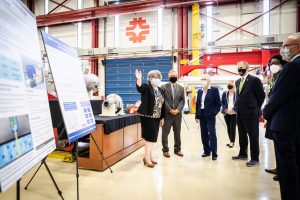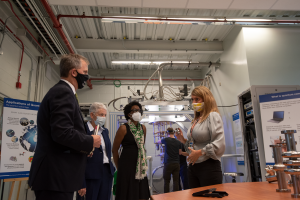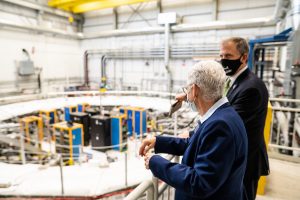
National Climate Advisor Gina McCarthy walks with Fermilab Director Nigel Lockyer and Fermi Site Office Deputy Manager Whitney Begner as they tour Fermilab on Aug. 10.
White House National Climate Advisor Gina McCarthy visited Fermilab on Aug. 10, to highlight the economic impact of the American Jobs Plan in the Midwest. McCarthy was joined by Reps. Sean Casten and Lauren Underwood, both from Illinois, as part of a tour of Argonne National Lab, Fermilab and North Central College. The Midwest tour aimed to highlight the importance of climate and clean energy in the region, especially in the areas of job creation, public health and economic opportunity. An American environmental health and air quality expert, she was named to the role by President Joseph Biden earlier this year.

PIP-II Project Director Lia Merminga (left) describes the PIP-II accelerator upgrade to Gina McCarthy, Reps. Sean Casten and Lauren Underwood.
McCarthy’s visit included brief tours of some of Fermilab’s main projects and was led by Nigel Lockyer, laboratory director, and Juan de Pablo, University of Chicago vice president for national laboratories, science, strategy, innovation and global initiatives.
“The visit was a wonderful opportunity to showcase Fermilab and showcase our spectrum of emerging technologies, such as quantum information science, accelerator technology, and real-time artificial intelligence and machine-learning. As we move ahead, we are committed to minimizing the environmental impact of our site operations and meeting our ambitious sustainability goals by modernizing our aging infrastructure with the latest energy-saving technologies,” Lockyer said.
The first stop of the tour showed the Accelerator Program, where PIP-II Project Director Lia Merminga talked with the group about the Proton Improvement Plan II, known as PIP-II, as an essential upgrade to Fermilab’s particle accelerator complex. The design complexity and state-of-the-art technologies of PIP-II, which have attracted strong international participation, were highlighted. The upgrade will enable a broad physics research program with particle beams and ensure American leadership in the study of neutrinos for decades to come.

SQMS Center Director Anna Grasselino (right) explains the SQMS Center and various applications of quantum computing. Photo: Hannah Adams, Fermilab
Showcasing Fermilab’s emerging technologies capability, Superconducting Quantum Materials and Systems Center Director Anna Grasselino led a walk through the SQMS Center, one of the five U.S. Department of Energy National Quantum Information Science Research Centers. Led by Fermilab, SQMS will transform advances in the field of quantum information science, engineering multiqubit quantum processors platforms with state-of-the-art qubits and related superconducting technologies. On the tour, Akshay Murthy, a postdoctoral research associate, presented how these advancements will make important impacts in tech transfer and commercialization of DOE technologies for QIS.
Muon g-2 co-spokesperson Chris Polly provided an overview of the magnetic ring of the Muon g-2 experiment that made worldwide headlines this spring. Describing how muons are produced, Polly explained how their behavior inside the 50-foot-diameter ring differs from theoretical predictions, as revealed in the first stage of the experiment’s data collection and unblinding. On April 7, the Muon g-2 collaboration published its first physics results that pointed to the potential existence of new particles or forces at work in the universe. This tour marked the first time McCarthy had seen a particle accelerator in person.

Gina McCarthy and Rep. Sean Casten looking over the magnetic ring of the Muon g-2 experiment.
Chief Operating Officer Kate Gregory shared Fermilab’s infrastructure upgrade plans, including the construction of the new Integrated Engineering Research Center. IERC incorporates a high-performance, energy-efficient building enclosure, as well as building automation systems, stormwater management and green roof. McCarthy was also interested in Fermilab’s initiatives to establish solar energy capabilities to support PIP-II and other projects that serve as a test bed for technologies to integrate renewable energy into micro- and nano-grids.
At the conclusion of the Fermilab tour, McCarthy took part in a press conference with Reps. Casten and Underwood in which she thanked them for their support and leadership.
“The tours of Argonne and Fermilab show me we are activating science to understand how we can live better lives, to understand how we can articulate the challenges we are facing on climate, but also find ways to turn those challenges into real opportunities we can act on,” McCarthy said regarding the visit.
Fermilab is supported by the Office of Science of the U.S. Department of Energy. The Office of Science is the single largest supporter of basic research in the physical sciences in the United States and is working to address some of the most pressing challenges of our time. For more information, please visit science.energy.gov.
